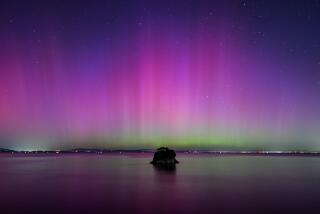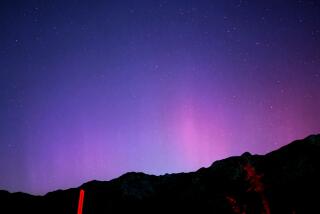Japanese flocking to Alaska to ‘buy the sky’ : Tourists pay premium rates in the dead of winter for a chance to view the aurora borealis.
- Share via
FAIRBANKS, Alaska — In a smoky, noisy roadhouse 3,500 miles from home, Noriko Morioka watches the snow falling outside and sighs. Nothing much to do but sit back down with her two friends and order another beer.
Back home in Tokyo, all three are dental assistants. This week they are tourists. For $2,200 each they have ventured here to the remote, frigid hills north of Fairbanks--to the wilderness, to America and, above all else, to a place where they might see the curtains and bands of green and pink light that sometimes dance across the northern sky.
The bar is packed with Japanese. They drink Budweiser, eat big plates of barbecued ribs, shoot pool, pop quarters into the jukebox. Hank Williams Jr. leers out of the television. A sled dog sniffs around in the hallway.
An American steps into the barroom. The Japanese talk nearly stops. Morioka speaks one of her few words of English.
“Aurora?” she asks, her eyes shooting skyward.
“Aurora now?” adds her friend, Akiko Yamagaki.
Japanese tourists have discovered Fairbanks. They have come by the thousands during the past several winters, paying $2,000 to $4,000 to stay in funky bunkhouses on the edge of civilization. For far less money they could be in Hawaii or skiing in the Canadian Rockies. Ask any of them why they are here. You will hear one word, over and over.
Aurora.
People long have been fascinated with the aurora borealis, the magnetically charged bands of color that often light up the winter Arctic skies. But few visitors are as enthusiastic as the Japanese. They make up the biggest group of non-summer visitors in a state that has struggled to find ways to lure tourists during the long, cold winters. The Division of Tourism estimates that 4,000 Japanese came last winter, and another 5,000 were expected by the end of this season.
They stand outside, at 30 degrees below zero, to catch a wisp of white light in the sky. And when it’s more than a wisp, when arcs of light flutter and race across the sky--which can happen in Alaska’s interior as often as anywhere--they pretty much go nuts.
Pam McLaughlin, co-owner of the Old F. E. Co. Gold Camp, a roadhouse and lodge that caters to Japanese tour groups, said Japanese reaction to the phenomenon is exceptional.
“I had a German and an Australian and three Americans and 18 Japanese all standing there watching the Northern Lights. The ones that weren’t from Japan were like, ‘Oh, this is interesting.’ They didn’t want to show they were impressed.
“The Japanese were absolutely, positively flipping out!”
The Gold Camp is one of several mom-and-pop businesses that have teamed up with Japanese travel agencies and are learning there is money to be made selling the sky. Bushy-bearded old-timers such as Pam McLaughlin’s husband, Larry, are learning Japanese. Greetings are posted in Japanese in the formerly rough-and-tumble barrooms.
The aurora passion has been fueled by aggressive marketing in Japan. Northern Lights rain down on travel posters in the Tokyo subway. A Japanese TV network dispatched a crew to Fairbanks for a week to feed back images of the Northern Lights during the evening news.
Alaska tourism officials have long focused on pushing summer tours, saying they never realized until recently that many overseas tourists would be interested in venturing north in winter.
“They tried to show it wasn’t cold and snow in Alaska,” said Kay Sugimoto, a Japanese tour operator who markets Alaska packages. “They don’t understand that Japanese are very interested in that experience.” Aside from the auroras, he said, they are curious about America and about real life here.
The biggest hitch has been the unpredictability of the auroras. While the Northern Lights can be seen over Fairbanks during more than 240 nights a year between August and early May, clouds can obscure the lights for days, even weeks, at a time. Lodges have started offering Alaska-style diversions, such as dog sled and snowmobile rides, skeet shooting and ice fishing, to help visitors pass the time.
“I tell everybody right off, there’s two things we don’t guarantee,” said Pam McLaughlin. “We don’t guarantee fish and we don’t guarantee Northern Lights. We can’t turn on a switch.”
More to Read
Sign up for The Wild
We’ll help you find the best places to hike, bike and run, as well as the perfect silent spots for meditation and yoga.
You may occasionally receive promotional content from the Los Angeles Times.






